|
|
| Solution: MBSE (Model-based Systems Engineering) based on EA |
| Author: Zu Tao, Dragon Fruit Software Engineering |
Based on EA as a modeling platform, integrate other tools through models,
Implement MBSE (Model-based Systems Engineering) |
| |
|
|
 MBSE tool chain MBSE tool chain |
| |
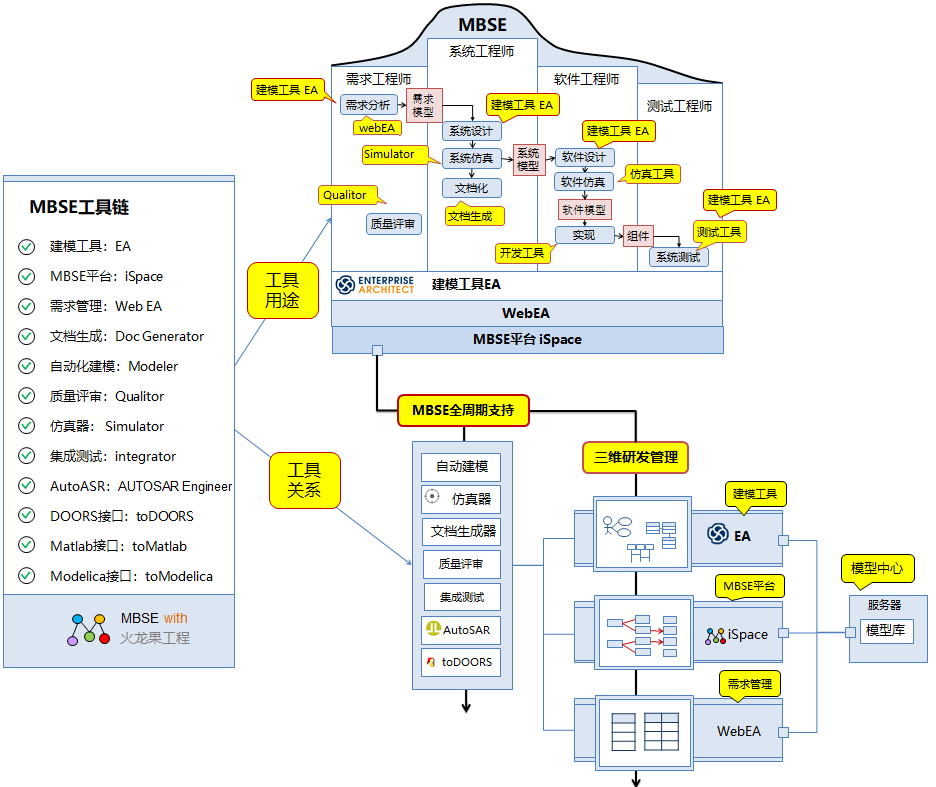 |
| |
| MBSE Solution Introduction: |
| MBSE (Model-based Systems Engineering) is an effective method for the analysis, design and development of complex systems. At present, the system scale of aviation, automobile, machinery, ship, machinery and enterprise informatization is getting larger and larger, and more and more professions are involved, so that the construction of the system is facing unprecedented challenges: |
- Multiple levels are involved: system - subsystem - module
- Multiple specialties: Software, Electronics, Mechanical, Optoelectronics, thermal...
- A variety of roles are required: systems engineer, software engineer, electronics engineer, professional engineer, test engineer
- Multiple development tools and languages are involved
|
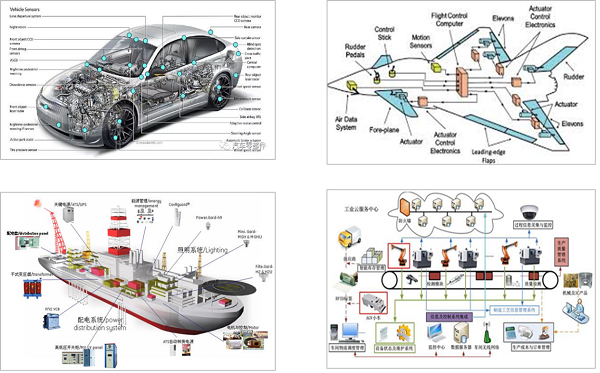 |
| When the system becomes more and more complex, the clear tracking of the relationship between various parts becomes more important. The model can guide engineers to sort out the work content, evolve from chaos to clarity, and then improve the ability of analysis and design. On this basis, the model will become the basis of professional accumulation and communication. |
|
 |
|
| In the field of systems engineering, MBSE (Model-driven systems engineering) can help us to conduct reasoning decomposition of system analysis and design, software analysis and design, and hardware analysis and design based on models, to achieve rigorous transformation and close tracking at each stage. Thereby improving quality and efficiency. |
|
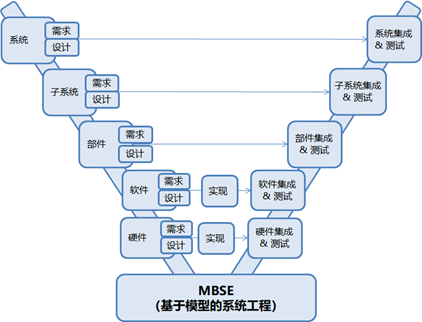 |
|
| MBSE (Model-driven Systems Engineering) involves the whole system development cycle, and the following is the overall workflow of MBSE: |
|
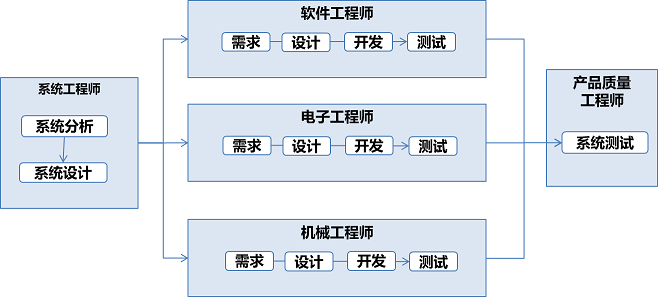 |
|
| All kinds of models are used throughout the system engineering process |
|
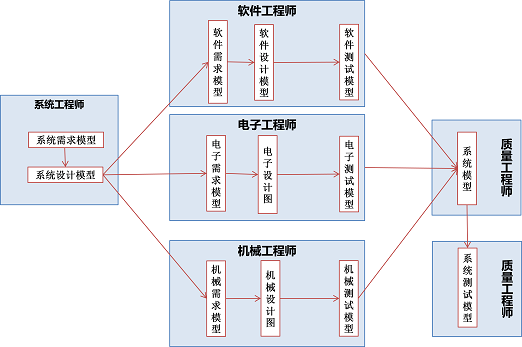 |
|
| These models involve different modeling criteria, such as: |
- Enterprise Architecture Modeling:Archimate
- Workflow modeling:BPMN
- System analysis design modeling:SysML
- Software analysis, design modeling:UML
- Physical system modeling:Modelica
|
| If different modeling tools are used, there is a huge communication cost and expertise span at each level of modeling, and EA supports all of the above modeling, enabling users to do all of the modeling, simulation, and tracking management in one tool when doing MBSE. |
|
 |
|
| MBSE's support tool platform: |
| In order to support the implementation of MBSE methodology, we choose the mainstream tools in each link of MBSE, integrate them into MBSE tool solutions, open the interface between various tools, realize MBSE through the data flow, and provide engineering warehouses to store various engineering data centrally. |
|
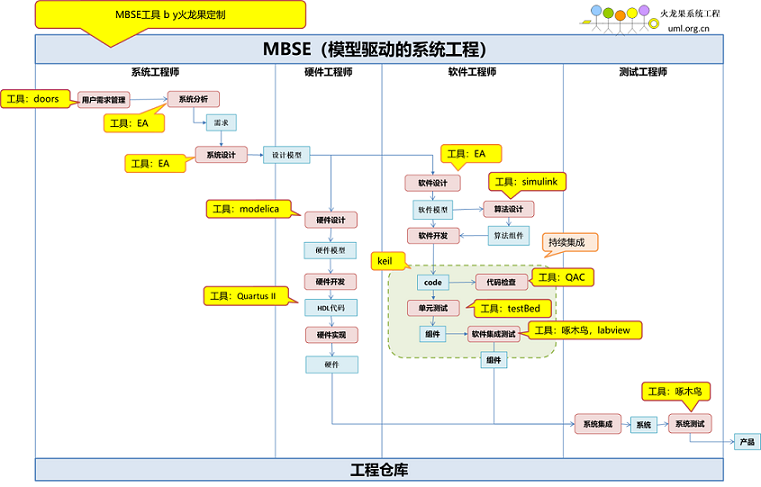 |
|
| It is best to have a modeling tool that can support the various models of MBSE. EA can provide the full cycle modeling of MBSE: enterprise architecture, system modeling, software modeling, algorithm modeling, hardware modeling, and can interface with various tools. |
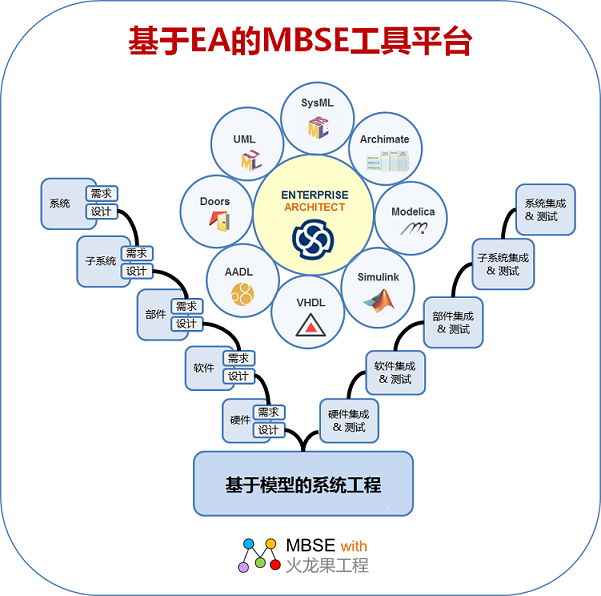 |
|
| As an integration platform for MBSE tools, the relationship between EA and other tools is as follows: |
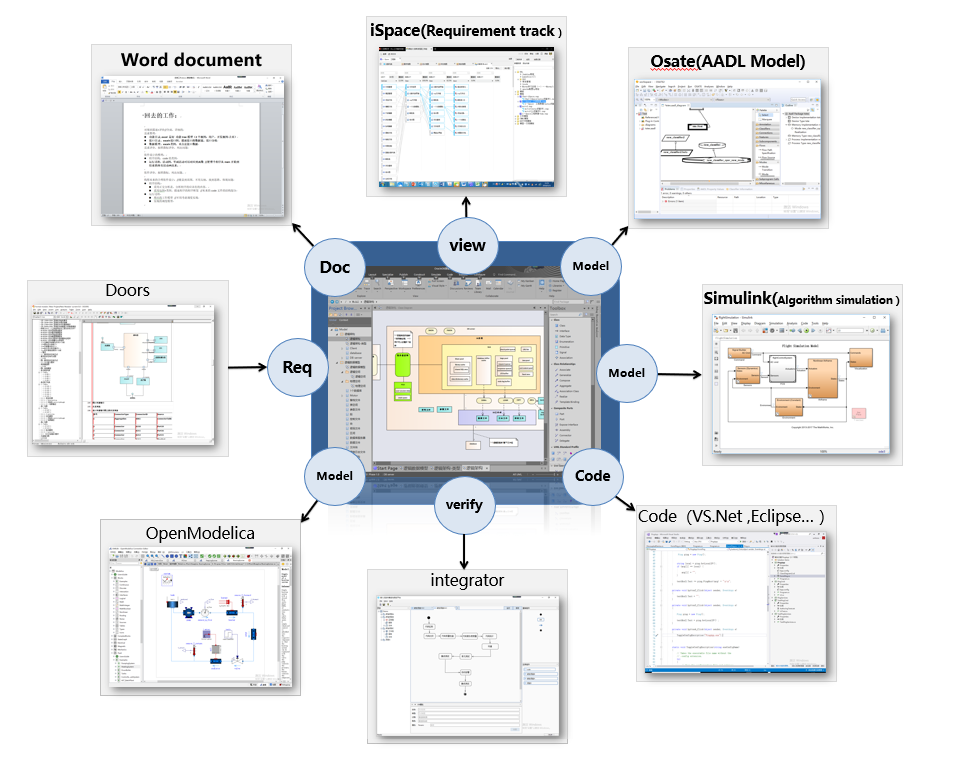
|
|
| MBSE working directory: |
| work |
Job description |
Model-based requirements management
|
The requirements model, design model, code model and test model are displayed in the form of a list of items, and all the models of system engineering can be associated and tracked in the form of a list, including requirements, design, code and test. |
Requirement item management
|
Register requirements in the form of item lists, import requirements documents, and you can associate and track requirements. |
| System analysis design and modeling |
System engineering analysis and design method is adopted, SysML modeling system is adopted to analyze and design model, and the system model can be run simulation, index analysis and verification. |
Software analysis design and modeling
|
Software engineering analysis and design method is adopted, software requirements and design model are modeled by UML, and code can be generated based on the design model to simulate and verify the model. |
Algorithm modeling and simulation
|
Using module diagram to model system structure unit, using state machine to describe control logic, using algorithm module to model algorithm function, can generate code, simulation and verification. |
System operation architecture modeling
|
For the analysis and design of various physical systems, Modelica can be used to model various physical units, algorithm logic and interface relations, generate code and simulation verification. |
Electronic analysis design and modeling
|
Electronic circuits can be analyzed, designed and modeled, and electronic devices, circuit nodes and lines can be modeled using PCB, and codes and simulations can be generated. |
Physical system analysis, design and modeling
|
For the analysis and design of various physical systems, Modelica can be used to model various physical units, algorithm logic and interface relations, generate code and simulation verification. |
Various document editing and reading
|
Various information can be described based on natural language (Chinese, English, French, German), and various figures can be interspersed to describe relationships and tables to list similar information, which can be read by various stakeholders as a carrier of communication between people. |
Software development
|
Write software programs in various programming languages (e.g. C, C++, Java, C#, Python, JavaScript) and compile them into executable programs. |
Continuous integration
|
Code review, unit testing, integration testing, functional testing. |
Tool bus
|
Model the workflow, tool, and artifact relationships throughout the system development cycle, supporting the interfaces of the various tools above:
The system analysis design model in EA generates word documents: system requirements documents and system design documents
The software analysis design model in EA generates the state machine algorithm model in matlab simulink
Requirements in Doors imported into EA: as a source for requirements models
Software design model generation code in EA: import to development tools Eclipse, VS.net for development
Components in EA are imported into the continuous integration platform integrator: drive code inspection, build, unit testing, integration testing
The system analysis design model in EA is imported into OpenModelica: for the design and simulation of the physical system
The software design model in EA is imported into AADL: for runtime design and simulation.
The hardware modules in EA are imported into Protel: for board design |
|
| MBSE Legend |
|
| Introduction to EA |
| As a modeling support tool for MBSE, EA can fully support MBSE-related modeling, simulation, document generation, code generation, model tracking and management work. The following is the functional architecture of MBSE based on EA: |
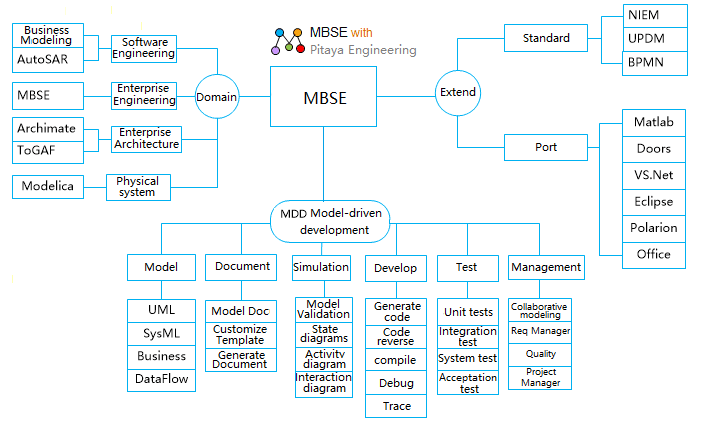 |
|
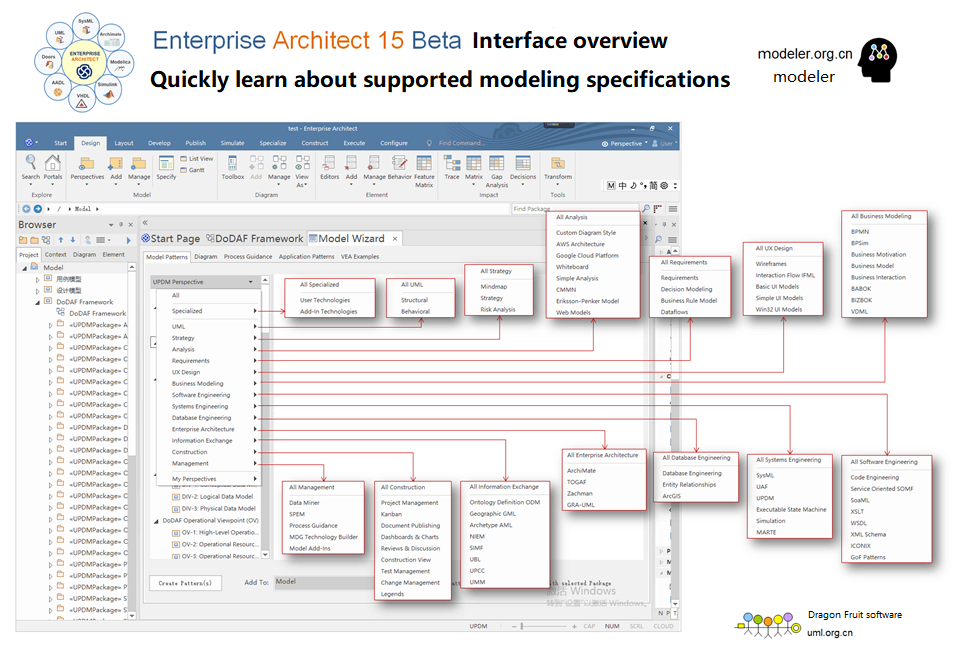 |
| EA Details |
| |
| Why choose EA |
|
| 400,000 users worldwide, tens of thousands of businesses and teams have chosen EA, such as: Methodologies of Continental Automotive Electronics, Bosch Automotive Electronics, United Automotive Electronics, Shanghai GM, Huawei R&D Center, Siemens Medical Devices, Siemens Power Automation, Philips R&D Center, Neusoft, Methodologies Corporation, Design of Information Systems, Fujitsu R&D Center, ZTE. Schneider Electric, Honeywell, ABB of Switzerland. |
| The reasons for choosing an EA are as follows: |
- Support MBSE entire lifecycle modeling: business modeling, system modeling, software modeling, physical system modeling, hardware modeling, data modeling, workflow modeling.
- Supported modeling standards: UML, SysML, BPMN, Archimate,DataFlow...
- The most complete code support: support more than 10 kinds of code reverse engineering: java, C#, C, C++, Python, SystemC, JavaScipt, Php and other more than 10 languages, you can also customize the code language.
- The most comprehensive modeling areas supported: Systems engineering, software engineering, embedded software, Enterprise architecture
- Integrated tools are::
- Integrated development tools: Eclipse, VS.Net, implementation model and coding integration.
- Integrated Office tools: Word, Excel, PPT to achieve the integration of documents and models.
- Provides interfaces with other modeling tools: Visio, Rose, PowerDesigner, etc., to achieve model asset reuse.
- Provides and requirements management tool interface: Doors, implementation of requirements entry import.
- Provide an interface with the database: you can directly connect to the physical database to realize data modeling and database instance synchronization.
- Powerful documentation functions: document modeling, document template customization, document generation, document management.
- The most powerful asset reuse: can reuse the model, the existing model into the asset library, to achieve reuse.
- Video: How to choose a modeling Tool
|
| MBSE service directory |
|
| Provide an interface with the database: you can directly connect to the physical database to realize data modeling and database instance synchronization. |
|
|
| |
| EA China General agent -- Dragon Fruit Software (China's leading software engineering service provider) |
| Beijing: 010-62670835, Email:teacher@uml.net.cn |
| Shanghai: 021-50800371, Email:shanghai@uml.net.cn |
| Shenzhen: 15801587207, Email:shenzhen@uml.net.cn |
|
|
 |
| |

|
|
